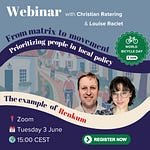On April 8th 1975 protests against the planned demolition of homes in the central Nieuwmarkt neighbourhood of Amsterdam ended in confrontations with over a hundred municipal police supported by 500 military police. These riots were the culmination of a long period of fierce, and sometimes violent, opposition to a number of projects and policies that would have radically changed the city of Amsterdam. Both land use and mobility systems were at the center of these tensions.
Last Tuesday, exactly 50 years later and during the Week van de Rechtvaardige Straat (the Dutch week for a just street), the Urban Cycling Institute together with Mark Ames (Strategic Cities) and Marco te Brömmelstroet (The Lab of Thought) came together to organize an online webinar looking back at what happened, how the city and its citizens interacted, why this was such a pivotal moment in the urban history of Amsterdam, and why this matters today.
Mark Ames, a specialist in strategic engagement and communication for contentious city projects, recently published an in-depth case study on the Nieuwmarkt riots. Mark kicked off the webinar with a keynote on his research, mapping how the different stakeholders interacted and uncovering communication and engagement lessons for other cities. He did a great job in putting together the events around the Nieuwmarkt riots into a coherent story and thereby connecting the dots of who was involved and played which role, while also reflecting on the role of a city’s competing network of narratives.
Mark’s presentation was followed by a reflection by Zomer Zeijlemaker, an urban historian with a focus on the right to the city. She currently works on a project related to the history of the Nieuwmarkt neighborhood and recently held an event with both older and newer residents of the neighborhood. From this event, Zomer recalled that residents are very passionate about not calling this part of history a riot but rather acknowledging the longer history of the Nieuwmarkt and how much earlier the squatting started. Along with this, all the love, care, and community that went into this neighborhood have to be remembered, because the residents were fighting for their right to stay in these spaces they created themselves in the absence of the government. Lastly, Marco te Brömmelstroet reflected on how all of this relates to the Overton window, arguing that what happened in the 1970s in the Netherlands was a radical widening of our conversations on what cities and mobility systems are about. Marco shared his position that in the Dutch context a lot of those radical voices have disappeared from the debate over time and are absent in such debates today. Throughout the entire webinar there was great engagement by the audience, with people directing their questions towards the speakers and sharing comments, remarks, and stories from their own contexts.
Watch the full recording to hear powerful stories, uncover forgotten histories, and reflect on what the future of just and livable streets could look like—starting with lessons from 50 years ago:
Related links:
Vote for the most just street
Sign the manifesto for the just street (if you live in the Netherlands)
Get a copy of the Nieuwmarkt case study
Support Urban Cycling Institute by becoming a paid Member
Check out our newly released Manifesto for Cycling Futures
Book a bike tour with us to learn more about how Amsterdam is approaching cycling and mobility
Written by , Research Fellow and Webinar Series Leader at the Urban Cycling Institute.
Interested in joining or sponsoring our webinars? Send us a pitch at media@urbancyclinginstitute.org














Share this post